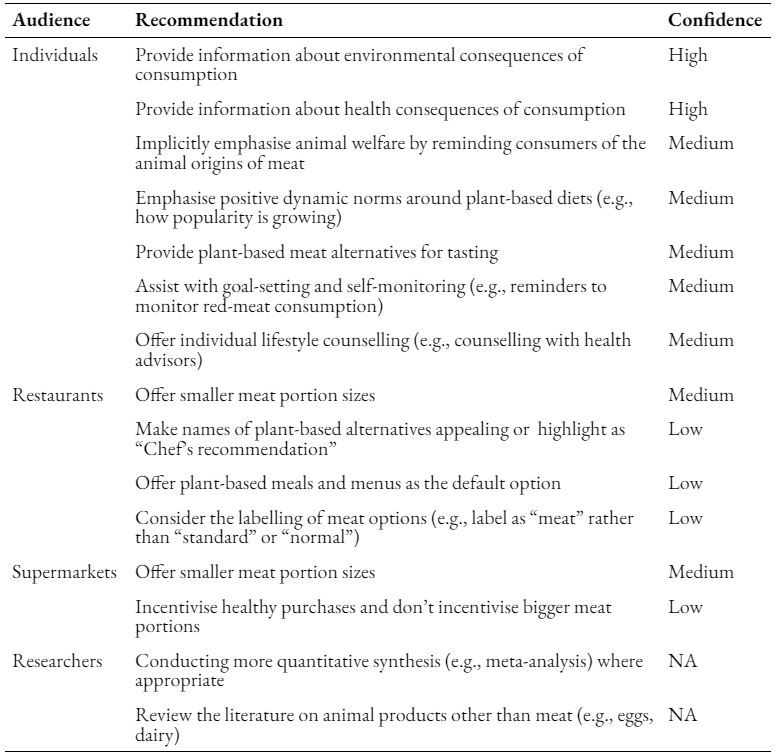Below is a plain-language summary of a recent meta-review we conducted at READI. The peer-reviewed paper is available for free at Future Foods journal.

The review in brief
Informing consumers about the environmental consequences of eating meat can reduce actual or intended consumption, although the quality of evidence is poor. Interventions that highlight health consequences, convey social norms, or provide smaller meat portion sizes may also be effective, but it is difficult to estimate the strength of these effects given the lack of quantitative evidence. Most reviews focus on meat, despite the comparable animal-welfare and environmental concerns around other animal products (e.g., factory-farmed eggs). In our review, we found that providing free samples increased dairy consumption. Further research could explore whether providing free samples can also promote plant-based alternatives.
Why did we do this review?

A transition toward a primarily plant-based diet could benefit public health, food security, animal welfare, the climate, and the conservation of biodiversity. The EAT-Lancet Commission report calls for a “Great Food Transformation” and a paradigm shift in our food systems. Yet, encouraging people to substitute plant-based foods for animal-product foods in their diets is difficult, and the question of how to change the eating habits of millions of people requires more attention.
What did we do in this review?
This review of systematic reviews ("meta-review") examined which interventions influence (increase or decrease) intended or actual consumption of animal products (e.g., meat, dairy, eggs).
What research did we find?
We synthesised evidence from 18 systematic reviews, 12 of which examined interventions intended to decrease animal-product consumption and 6 of which examined interventions intended to increase animal-product consumption.
What are the implications of the findings for key audiences?
The recommendations table below sacrifices precision for concision: please read the full paper for details on methodology and results. Given that quantitative effect size estimates were seldom available, confidence ratings are based on the number of supporting studies. They are also relative, describing the strength of that recommendation relative to the other interventions we report on. The recommendations don’t consider cost-effectiveness (e.g., lifestyle counselling may be effective but also resource intensive) nor outline all the interventions included in the full paper.

Results from reviews on increasing dairy consumption imply that group-setting interventions (e.g., school milk programs) could also involve plant-based alternatives. Offering free tastings of plant-based substitutes might reduce the demand for animal products, given the effectiveness of taste exposure and increasing familiarity with dairy products. Note that these claims are highly speculative as reviews on increasing dairy consumption did not examine plant-based alternatives.
How up-to-date is this review?
The authors searched for studies published up until February, 2020.
Where to get further information?
You can read the full peer-reviewed paper for free at Future Foods journal.
What is READI?
READI coordinates and conducts behaviour science research to improve decision-making and behaviour for the world's most pressing problems. If you would like to leave anonymous feedback on this project, you can do so here. You can also email myself, the project lead, emily.grundy@monash.edu.
Acknowledgements
Thank you to everyone involved in completing and supporting this research, including: Peter Slattery, Zan Saeri, Kieren Watkins, Thomas Houlden, Neil Farr, Henry Askin, Joannie Lee, Alex Mintoft-Jones, Sophia Cyna, Alyssa Dziegielewski, Romy Gelber, Amy Rowe, Maya Mathur, Shane Timmons, Kun Zhao, Matti Wilks, Jacob Peacock, Jamie Harris, Daniel Rosenfeld, Chris Bryant, David Moss, and Michael Noetel. Thanks also to Annet Hoek and Jo Anderson for their contributions to the research direction of this project and the manuscript.

Please see this post for a slightly more in depth summary of the interventions we identified.